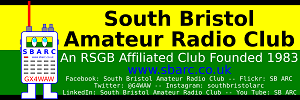You are encouraged to share this post with your friends, acquaintances, colleagues and family by all channels available to you.
News posts, such as this, published on the SBARC website are re-posted via a number of other channels including social media feeds and our Groups.io mailing lists. These external services may alter the formatting or layout of the original News Post. If you want to see this News Post in its original form please visit the SBARC website News page and follow the link or links to the story or stories of your choice.
In June 2023 OfCom opened a consultation entitled ‘Updating the Amateur Radio Licensing Framework‘. The consultation opened on 23 June 2023 and closed on 5 September 2023.
The proposals split into 4 basic categories and were designed to simplify the UK Amateur Radio Licence and its Terms and Conditions, associated documentation and processes. The 4 basic categories of change were as follows:
- Update the overall licensing framework,
- Streamline and modernise call sign assignment,
- Adjust technical parameters to reflect the evolving needs of the hobby and provide radio amateurs with greater operating freedom, and
- Provide clearer updated rules (terms and conditions which are easy for everyone to understand).
OfCom received 1443 responses to the consultation which, whilst not large in the context of the 80,000 or so “live” Amateur Radio Licences, was larger than other recent consultations that OfCom had operated.
On the 11th December 2023 OfCom published ‘Updating the Amateur Radio Licensing Framework‘ a summary of the the consultation responses along with details of their intentions and changes that were proposed following consideration of the consultation responses.
Whilst the changes were broadly supported by most consultation responses there were concerns which OfCom sought to address, in whole or in part, through some changes to the proposals.
The document ‘Updating the Amateur Radio Licensing Framework’ set out the three phases of implementation as follows:
- Phase 1: changes implemented through a variation process to the amateur radio licence,
- Phase 2: changes that require minor modification to the existing licensing platform or other specific action from Ofcom, and
- Phase 3: changes that require the new licensing platform to be in place.
| Phase 1 (Licence variation required) |
Phase 2 (Licensing platform modification or other Ofcom action required) |
Phase 3 (new licensing platform required) |
|---|---|---|
| Allow third party supervised operation. RSL use optional and allow wider use of ‘E’ for England. Special RSL notification. Call sign suffix provisions. Increased transmit power. Foundation and Intermediate use of the internet for remote control links. Allowing low power airborne use in primary amateur bands. Incorporating some NoVs (Notices of Variation) into the Licence. |
New Intermediate M8 and M9 call sign prefix. Restriction on the number of call signs. Liberalisation of the use of the Special Event Station NoV. |
Improvements to the online revalidation process. Holding of a single personal licence and revocation of lower licence as a licensee progresses. Choice of wider range of unused amateur call signs via the online portal. Ability to change call sign periodically. |
| Proposed Implementation Date | ||
| By end of February 2024 | Planned for this to be in 2024 | Planned for this to be later in the 2024/25 financial year |
| Status | ||
| Implemented on time | Delayed – Expected April – June 2025 | Delayed – No expected date |
Note that the table above does not contain an exhaustive list of the changes in each phase of the implementation.
On 25 October 2024 OfCom published an Update on Licensing Platform Evolution (LPE) release 3 and impacted spectrum policy implementation timeframes stating:
We are notifying stakeholders that the implementation of the third release of our Licensing Platform Evolution (LPE 3) has been delayed due to issues that have arisen during product development. The delays have impacted the availability of our first phase of automation for shared access licences and have also delayed implementation of a few other policy decisions.
The impacted (delayed) policy decisions include primarily those documented in:
- Updating the amateur radio licensing framework (Phases 2 and 3),
- Extending access in the 26 GHz bands for Shared Access, and
- a subset of the Proposed enhancements for Shared Access.
LPE 3 was originally planned for calendar Q2 2024 and is now expected to be available in calendar Q2 2025.
Based on the LPE 3 planned implementation date of calendar Q2 2024 (probably the later part of the period April – June) it would appear that LPE 3 was effectively the changes to the existing Licensing Platform required to implement Phase 2 of the Amateur Radio Licence changes. It was understood that Phase 3 would require the Licensing Platform to be replaced or at least substantially changed beyond the capabilities of the current system. It follows, therefore, that the delay to LPE3 will further extend the time required to implement Phase 3.
This represents a delay of 1 year for the implementation of Phase 2, and although Phase 3 was supposed to follow within 9 months based on the original programme dates it is more likely that this will also slip meaning that Phase 3 is probably unlikely to appear before the end of Financial Year 2026/27!
How to say “Government IT Project” without saying “Government IT Project“!

